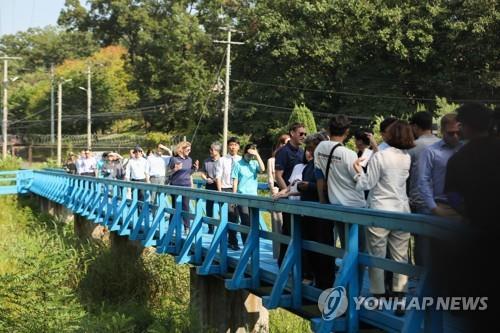
Participants in a DMZ peace trail program visit the border village of Panmunjom in Paju, Gyeonggi Province, in August last year. (Korea Institute for International Economic Policy / Yonhap)
A western border hiking trail along the Demilitarized Zone separating the two Koreas will reopen to the public next week, about 11 months after its closure due to the outbreak of African swine fever, authorities said Saturday.
The municipality of Paju of Gyeonggi Province, about 30 kilometers northwest of Seoul, said it will reopen its DMZ hiking trail to tourists next Tuesday.
In consideration of the ongoing outbreak of the coronavirus, however, the municipal government said it will limit the number of daily hiking tour programs to 10, while allowing only a maximum of 20 people to join the course at one time. Group tours will be operated by reservation only.
The DMZ, which is about 250 kilometers long and 4 kilometers wide, is one of the world's most heavily fortified borders, with the rival Koreas technically in a state of conflict as the 1950-53 Korean War ended in a truce, not a peace treaty.
The Paju trail is one of three hiking routes that opened to the public last year under the DMZ Peace Trail program intended to allow visitors to experience inter-Korean peace and the security situation on the Korean Peninsula. Two other trails in Goseong and Cheorwon, both of Gangwon Province, have also been closed due to the outbreak of African swine fever.
The Paju course, which is around 20 kilometers for a round trip, starts from the Imjingak Pavilion and leads to a demolished guard post via the Dorasan Observatory.
The Paju government said it has already completed joint field inspections and quarantine measures, together with relevant central government agencies, to prevent the recurrence of the infectious disease of domestic and wild pigs.
The municipality also said it has worked out all possible countermeasures, including installation of fever screening equipment, to prevent the spread of COVID-19 among tourists.
In particular, it and the Army jointly conducted a tourism simulation for 20 people earlier this week to check the density of the trail facilities.
The city said it will take additional quarantine measures depending on the situations of the African swine fever and coronavirus outbreaks and hire a number of senior workers to ensure anti-coronavirus guidelines are thoroughly observed along the trail route. (Yonhap)






